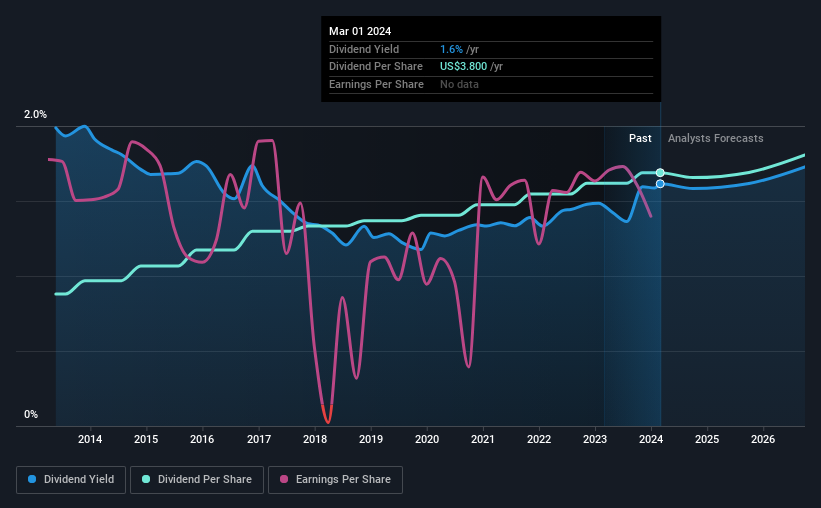Should You Buy Becton, Dickinson and Company (NYSE:BDX) For Its Upcoming Dividend?
Readers hoping to buy Becton, Dickinson and Company (NYSE:BDX) for its dividend will need to make their move shortly, as the stock is about to trade ex-dividend. The ex-dividend date is usually set to be one business day before the record date which is the cut-off date on which you must be present on the company's books as a shareholder in order to receive the dividend. The ex-dividend date is important because any transaction on a stock needs to have been settled before the record date in order to be eligible for a dividend. Accordingly, Becton Dickinson investors that purchase the stock on or after the 7th of March will not receive the dividend, which will be paid on the 29th of March.
The company's upcoming dividend is US$0.95 a share, following on from the last 12 months, when the company distributed a total of US$3.80 per share to shareholders. Last year's total dividend payments show that Becton Dickinson has a trailing yield of 1.6% on the current share price of US$235.31. Dividends are a major contributor to investment returns for long term holders, but only if the dividend continues to be paid. As a result, readers should always check whether Becton Dickinson has been able to grow its dividends, or if the dividend might be cut.
View our latest analysis for Becton Dickinson
Dividends are typically paid from company earnings. If a company pays more in dividends than it earned in profit, then the dividend could be unsustainable. It paid out 84% of its earnings as dividends last year, which is not unreasonable, but limits reinvestment in the business and leaves the dividend vulnerable to a business downturn. We'd be worried about the risk of a drop in earnings. Yet cash flow is typically more important than profit for assessing dividend sustainability, so we should always check if the company generated enough cash to afford its dividend. It distributed 42% of its free cash flow as dividends, a comfortable payout level for most companies.
It's positive to see that Becton Dickinson's dividend is covered by both profits and cash flow, since this is generally a sign that the dividend is sustainable, and a lower payout ratio usually suggests a greater margin of safety before the dividend gets cut.
Click here to see the company's payout ratio, plus analyst estimates of its future dividends.
Have Earnings And Dividends Been Growing?
Businesses with strong growth prospects usually make the best dividend payers, because it's easier to grow dividends when earnings per share are improving. Investors love dividends, so if earnings fall and the dividend is reduced, expect a stock to be sold off heavily at the same time. It's encouraging to see Becton Dickinson has grown its earnings rapidly, up 48% a year for the past five years. Earnings per share are growing at a rapid rate, yet the company is paying out more than three-quarters of its earnings.
Another key way to measure a company's dividend prospects is by measuring its historical rate of dividend growth. In the past 10 years, Becton Dickinson has increased its dividend at approximately 6.7% a year on average. We're glad to see dividends rising alongside earnings over a number of years, which may be a sign the company intends to share the growth with shareholders.
To Sum It Up
Has Becton Dickinson got what it takes to maintain its dividend payments? Becton Dickinson's growing earnings per share and conservative payout ratios make for a decent combination. We also like that it paid out a lower percentage of its cash flow. Overall we think this is an attractive combination and worthy of further research.
While it's tempting to invest in Becton Dickinson for the dividends alone, you should always be mindful of the risks involved. For example - Becton Dickinson has 2 warning signs we think you should be aware of.
A common investing mistake is buying the first interesting stock you see. Here you can find a full list of high-yield dividend stocks.
Have feedback on this article? Concerned about the content? Get in touch with us directly. Alternatively, email editorial-team (at) simplywallst.com.
This article by Simply Wall St is general in nature. We provide commentary based on historical data and analyst forecasts only using an unbiased methodology and our articles are not intended to be financial advice. It does not constitute a recommendation to buy or sell any stock, and does not take account of your objectives, or your financial situation. We aim to bring you long-term focused analysis driven by fundamental data. Note that our analysis may not factor in the latest price-sensitive company announcements or qualitative material. Simply Wall St has no position in any stocks mentioned.

